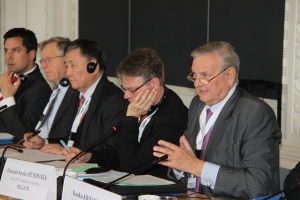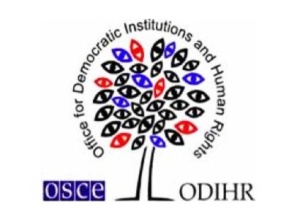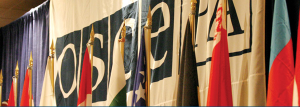
A meeting of the OSCE Permanent Council in the Hofburg in Vienna, Austria (Photo credit: Wikipedia)
The diplomatic row between Azerbaijan and the OSCE regarding the mandate of the OSCE Office in Baku went public last week in Vienna.On 14 May 2013, whilst in Vienna accompanying President Ilham Aliev who was on a state visit to Austria, the Foreign Minister of Azerbaijan, Elmar Mammadyarov, took time to address formally the representatives of the 57 participating States of the Organisation for Security and Co-operation in Europe (OSCE) at a meeting of the Organisation’s Permanent Council.
Couched in diplomatic language the Minister’s speech, and the response to it from many of the diplomats present, highlighted a serious stand-off on the issue of the role of the Office of the OSCE in Baku. The office was established in 1999 and was seen as an important mechanism to accompany Azerbaijan’s programme of reforms aimed at bringing it in line with OSCE commitments.
Over the recent months Azerbaijan has been asking for the mandate of the office to change, in practise reducing its role to that of a technical office. Since the budget of the office is part of the OSCE budget, and since the budget needs to be approved by consensus by all the member states Azerbaijan has been hinting that it may veto the whole budget unless its request is satisfied.
This is only one of many issues that have emerged over the last year in Azerbaijan’s relations with the EU and other countries as a result of a crack-down against all form of dissent in the country.
read the current mandate of the OSCE office in Baku here.OSCE Baku office mandate More…


 The Elections Observation Missions of the Office for Democratic Institutions and Human Rights of the Organisation for Security and Cooperation in Europe (ODIHR) have become a regular feature of the electoral process on the European continent, and a model for others world-wide. The Missions, consisting of a core team and a handful of long term observers deploy a month ahead of the poll and are joined for election-day by several hundred short term observers and delegations from the Parliamentary Assemblies of the continent’s leading institutions. Whilst not perfect, the ODIHR model remains the best.
The Elections Observation Missions of the Office for Democratic Institutions and Human Rights of the Organisation for Security and Cooperation in Europe (ODIHR) have become a regular feature of the electoral process on the European continent, and a model for others world-wide. The Missions, consisting of a core team and a handful of long term observers deploy a month ahead of the poll and are joined for election-day by several hundred short term observers and delegations from the Parliamentary Assemblies of the continent’s leading institutions. Whilst not perfect, the ODIHR model remains the best.
